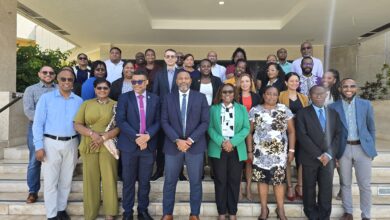Heads of Government of the Caribbean Community met in emergency session from 11-12 October, 2001 in Nassau, The Bahamas. Heads of Government in attendance were: The Rt. Hon. Hubert A. Ingraham, Prime Minister of The Bahamas; the Rt. Hon Owen S. Arthur, Prime Minister of Barbados; Dr. the Hon. Keith C. Mitchell, Prime Minister of Grenada; His Excellency Bharrat Jagdeo, President of the Cooperative Republic of Guyana; the Rt. Hon. Percival J. Patterson, Prime Minister of Jamaica; Hon. Dr. Denzil Douglas, Prime Minister of St. Kitts and Nevis; and Dr the Hon. Kenny D. Anthony, Prime Minister of Saint Lucia.
Antigua and Barbuda was represented by Hon. Molwyn Joseph, Minister of Tourism and Environment; Dominica by Hon. Charles Savarin, Minister of Tourism; St Vincent and the Grenadines by Hon. Louis Straker, Minister of Foreign Affairs; Suriname by Hon. Ms Maria Levens, Minister of Foreign Affairs and Trinidad and Tobago by Hon. Mervyn Assam, Minister of Enterprise Development and Foreign Affairs.
Belize was represented by His Excellency Assad Shoman, Senior Ambassador with Ministerial Rank. Haiti was represented by Mr Joseph Etienne, Charge d’Affaires, Ministry of Foreign Affairs.
The Turks and Caicos Islands was represented by Hon. Derek E. Taylor, Chief Minister. Anguilla was represented by Ms Donna Banks, Special Assistant in the Chief Minister’s Office.
Representatives of the Tourism sector including the Caribbean Tourism Organisation (CTO), the Caribbean Hotel Association (CHA), and representatives of regional and international airlines and the cruise lines, as well as other international and regional agencies, were also invited to participate.
The Meeting was preceded by a preparatory Meeting of Ministers responsible for Foreign Affairs, Tourism, Aviation and Security on 10 October, 2001.
The Meeting was chaired by the Rt. Hon. Hubert A. Ingraham, Chairman of the Conference. In his opening statement, the Chairman called for a minute’s silence for those killed in the terrorist attacks in the United States of America. The Chairman also highlighted some of the major implications for the Region’s tourism and other sectors, including the the drastic declines in incomes and earnings of critical sectors of the economy particularly the tourism, financial and aviation sectors, the major foci of the emergency meeting.
The Impact of the 11 September Attacks on the Region
Heads of Government focused their attention on the terrorist attacks on the USA of 11 September 2001 and their impact on the Caribbean and agreed to issue the Nassau Declaration on International Terrorism: The CARICOM Response on the issue.
In addressing the impact on the Region, Heads of Government agreed to a number of consequential actions which needed to be implemented, as follows:
Tourism and Transportation
- A US$18 million major tourism promotion and marketing development campaign centering primarily on the USA, UK and Canadian markets, contributed by Governments and the private sector;
- The convening of the Tourism Summit which has been postponed, to the 8-9 December, 2001 in The Bahamas;
- The enhancement of aviation security involving both the airports and the airlines, taking into account the recent conclusions of the recently held Thirty-third Assembly of the International Civil Aviation Organisation;
- In the immediate term, the attachment of high priority to assisting regional airlines with respect to liquidity problems arising from operating losses incurred in the immediate post-September 11 period, the requirements for procuring additional aviation insurance and in facilitating the easy transfer of passengers at Regional airports.
- In the longer term, to consider requests from indigenous airlines for assistance in dealing with persistent long-term liquidity problems.
Security
- The immediate consideration for adoption and implementation of a range of pertinent international conventions and protocols, by the Legal Affairs Committee of the Community, to address the issue of international terrorism;
- Greater coordination and collaboration among regional security services, particularly in intelligence gathering, analysis and sharing, with a focus on crime, illicit drugs and terrorism;
- Heightened security at airports and seaports and at borders;
- An agreed framework for operational cooperation among the security services, to meet the immediate and long term responses;
- Implementation of the decision to establish the Task Force on Crime and Security which was established by the Conference of Heads of Government of the Caribbean Community in Nassau in July 2001, so as to carry out, inter alia, the policy directives emerging from this Special (Emergency) Meeting. The Task Force which will consist of Security and other officials from Member States, will commence its work immediately and will hold its initial meeting in Trinidad and Tobago at the end of October.
Finance and Insurance
- The presentation of a request by the Region through a CARICOM Head of Government to the European Union for emergency financing under the ACP-EU Convention;
- A high level Regional delegation to approach the Inter-American Development Bank with a concrete plan of action relating to the Region’s emergency financing needs in light of the devastating impact on the Region’s economies;
- The urgent convening of a meeting of the Caribbean Association of Regulators of International Business (CARIB) to discuss the implementation of UN Security Council Resolution No. 1373 of 28 September 2001, which, among other things, compels Member States to criminalise the funds of any of their nationals supporting terrorist activities and to freeze the assets of persons or entities associated with such activities;
- Support for the creation of pooling mechanisms, mainly for the aviation and hotel industries in the Region, in order to mitigate the burden of high insurance and re-insurance costs, and so provide protection above the limits that commercial insurers are willing to offer;
- The early convening of a working party to develop proposals on incentives to insurance companies to facilitate the strengthening of their capital reserves.
The Regional Negotiating Machinery
Heads of Government received a report from the Chairman of the Prime Ministerial Sub-Committee on External Economic Negotiations (RNM) on the future structure of the Regional Negotiating Machinery. They emphasised the importance of the RNM to the effective conduct of the Region’ss external negotiations.
Heads of Government agreed to certain changes in the structure of the RNM, prime among them being the creation of the position of Director General which merges the previous functions of Chief Negotiator and Chief Technical Adviser. They also agreed to changes in the method of functioning of the RNM, requiring it, while retaining its reporting relationship to the Prime Ministerial Sub-Committee on External Economic Negotiations, to work in close consultation with the Council for Trade and Economic Development (COTED). It also agreed to designate Ministerial spokespersons to spearhead the three areas of negotiations – the FTAA, the WTO and the EU-ACP. They agreed that the principal office of the RNM will now be based in Jamaica consequent on the closure of the London office. The Heads of Government expressed their profound gratitude to Sir Shridath Ramphal, the outgoing Chief Negotiator of the RNM.
The Future of the Caribbean Agricultural Research
and Development Institute (CARDI)
Heads of Government received the proposals from His Excellency the President of Guyana on the future of the Caribbean Agricultural and Research Development Institute (CARDI) and decided after deliberations to further discuss the matter at the Fourteenth Inter-Sessional Meeting of the Conference to be held in Belize in February 2002, after receiving the views of the Ministers of Agriculture.
Civil Society Conference
Heads of Government agreed to postpone the Civil Society Conference “Forward Together” scheduled to be held in Barbados 12-13 November, 2001, to early in 2002, given the need for further preparation of the countries and their present focus on the current crisis triggered by the events of September 11 in the USA.
The Community’s Response to the Hurricane
Recovery Efforts in Belize
Heads of Government received a report on the impact of Hurricane Iris on Belize which took some twenty lives, left over 13,000 homeless and caused massive destruction in the agricultural sector and of the economic and social infrastructure.
They expressed their profound sympathy to the Government and people of Belize on the loss of life and particularly to the bereaved families. They pledged the support of their governments to the restoration and reconstruction efforts in Belize.
Appreciation
Heads of Government expressed their deep appreciation to the Government and people of The Bahamas which had so ably hosted them in their Emergency Session.
Nassau, The Bahamas
12 October, 2001





